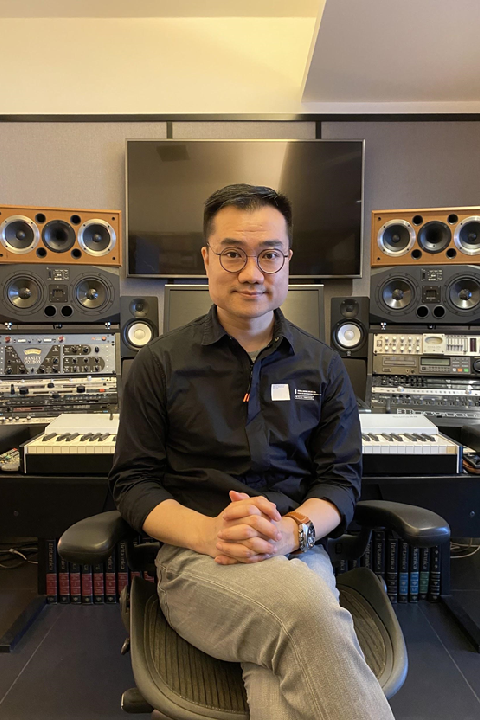Recipient of Sir Edward Youde Memorial Fellowships in 2000/01
尤德爵士紀念基金研究生獎學金2000/01年得獎者
It is many people’s dream to forge a career out of one’s interest. However, the recipient of Sir Edward Youde Memorial Fellowships in 2000/01, pop music composer, Dr. Edmond Tsang decided to choose history, his secondary interest, as his career at first due to concerns of losing his passion for music upon devoting a full-time career to it. However, his dual development in both music and history eventually turned into a constant feature throughout his career.
While Dr. Tsang has shown a strong affinity towards music since childhood, he also developed his passion towards music throughout his secondary school studies. Upon entering university, Dr. Tsang enrolled into the Double Bachelor’s Programme in History and Music from The University of Hong Kong. Despite originally aiming for a career in historical research, an incident during Year 2 diverted him towards the musical industry, when a few close friends proposed to start a production house for commercial music. Excelling in his musical studies, Dr. Tsang subsequently studied his Master of Philosophy in Music at The University of Hong Kong. He then combined his knowledge from multiple disciplines including historical research, politics and sociology to research on the use of Beethoven’s music for political propaganda following the establishment of modern China. After graduation, Dr. Tsang joined the popular music industry, contributing to the production of popular music, background music and film music. Coincidentally, he later discovered from historical archives that contrary to popular perception, political parties existed in Hong Kong before the 1980s. This prompted him to continue his academic journey by enrolling into the Doctor of Philosophy in History programme in The Chinese University of Hong Kong to research on this topic.
Since childhood, Dr. Tsang has been a musical enthusiast. His family could not afford him long term Western classical music training, but his relatives subsidised him a few years of piano lessons. Upon entering into the university, he began to write music, with a focus in advertisement music in the beginning. During his first year studying MPhil, his friends encouraged him to try composing pop music. Recalling the first pop music that he composed, he was inexperienced and did not know where to start. While watching TV in his living room, he came across Franz Liszt’s la Campanella and prompted him to write I Know Not How to Sing. The song was acquired by a record label and began his journey of writing pop music.
Having dedicated years in the local pop music industry, Dr. Tsang has witnessed the ups and downs of the field, and is still having great hopes for its future development. He admitted that the industry no longer generates as much revenue as it did in its peak years, nor would it be very likely that such a situation could be recreated. Nevertheless, artists nowadays can venture out of the boundaries of a previously mostly business-driven industry and have more room for creativity, delivering pieces of more variety in terms of content and style. Moreover, the advancement in technology has allowed creators to compose music of high quality with more budget-friendly computer and sound equipment, lowering the barriers to enter into the field and offering more opportunities for talented composers.
Looking forward, Dr. Tsang aims to continue his development in the intersections of music and history through education and research. Apart from teaching history, creative thinking, sociology, music and entrepreneurship in the Technical and Higher Education Institute of Hong Kong, Dr. Tsang has been collaborating with professors from The Baptist University to research the impacts of technology on the creative expression of popular music since the 2000s. Despite Dr. Tsang’s near-term focus on academic research, he aims to return to the music industry in the long term to continue his dual development across both disciplines in music and history.
Reflecting upon his experience of receiving both the Sir Edward Youde Memorial Fellowship for Postgraduate Research Students and Sir Edward Youde Memorial Scholarship for Undergraduate Students, Dr. Tsang expressed his gratitude towards the financial support that he received, which supported his living expenses and allowed him to launch his music career by procuring professional equipment. Having arranged many popular pieces over the past years, Dr. Tsang continues to be a renowned composer in Hong Kong today. At the same time, he furthers his interest in history by being a lecturer at THEi, developing his interests in both fields.
把興趣變成事業,是很多人一生的夢想。但是,尤德爵士紀念基金研究生獎學金2000/01年得獎者,流行曲作曲家曾奕文博士,卻擔心工作的壓力使他對興趣失去熱誠,決定把自己的第二興趣變成事業。現時他的事業都是圍繞著他的兩大興趣。
曾先生自小對歷史和音樂充滿興趣。入大學的時候,曾先生報讀了香港大學歷史和音樂的雙學士學位,原以爲會從事歷史方面的學術研究,卻在大學二年級的時候認識了志同道合的朋友,開辦了一家音樂製作公司,開始從事商業音樂。其後曾先生因爲音樂成績優異入讀香港大學的音樂哲學碩士,從歷史的角度出發,研究中國建國後如何詮釋貝多芬的音樂,並用作政治宣傳,探討音樂與政治、外交、社會發展和意識形態之間的關係。碩士畢業後,曾先生機緣巧合之下進入了流行音樂產業,涉獵流行曲、背景音樂和電影配樂。後來,曾先生在2010年從文獻中發現香港在80年代以前已經有政黨存在,和主流的説法不同,因此開始攻讀香港中文大學的歷史博士學位,從事香港早期政黨的研究。
曾自小便已經對音樂展現濃厚的興趣及天份,但因家境所限,沒有接受過傳統的西洋音樂訓練,只是在親戚的資助下,學習過幾年鋼琴。在大學期間他開始接觸作曲,最初主要創作廣告歌曲。後來讀碩士期間,在朋友的鼓勵下踏足流行歌的領域。他憶起第一首作的流行曲是《我不會唱歌》,當時缺乏經驗,不知從何入手;坐在客廳苦惱之際,隨手開了電視機,聽到李斯特的《鐘》,靈機一觸便寫下了《我不會唱歌》。這歌有幸地被唱片公司買下,就此開啟了曾創作流行歌曲之旅,亦成為他印象最深刻的作品。
在香港樂壇耕耘多年,見證過高高低低,但他仍然對於未來樂壇的發展充滿希望。他承認樂壇所帶動的經濟效益已大不如前,未必能重現如80年香港樂壇賺得盆滿缽滿的情況。但正是擺脫了以往商業的限制,如今藝人在創作上有更大的空間,能呈現更多元化的內容和風格。例如以往的流行歌曲以情歌為主,但現在聽眾會追求題材上會觸及民生和社會議題的歌曲。再者,科技的發展亦令歌曲創作的門檻大大降低,能夠以較低成本的器材和電腦設備去錄製高質素的歌曲,提供了更多機會給有才華的創作者入行。
放眼未來,曾先生將繼續融合音樂和歷史,致力從事教育和研究。除了在香港高等教育科技學院教授有關歷史、創業、創意、社會學和音樂等領域的科目,曾先生也正跟香港浸會大學的教授合作,透過訪問香港資深音樂人,探討千禧年後科技的變化如何影響香港流行曲的創作。雖然曾先生表示短期内將在音樂方面減產,以投放更多時間從事學術研究,然而長遠來説會繼續在樂壇耕耘,平衡音樂和歷史兩方面的興趣。
尤德爵士紀念基金對曾博士影響深遠。除了研究生獎學金外,他亦曾在本科期間獲得尤德爵士紀念基金獎學金。出身草根的曾博士在大學時需要學費資助及生活貸款,獲得基金會的財政支援,加上其他不同的獎學金使到曾博士能夠購買專業的音樂器材,繼而踏上了他從事音樂事業的道路。今天,曾博士是香港一名知名的作曲家,在過去多年編織出多首膾炙人口的歌曲。同時間,出於對歷史的興趣,他亦在高等教育擔任講師,在兩個興趣領域中發揮所長。

